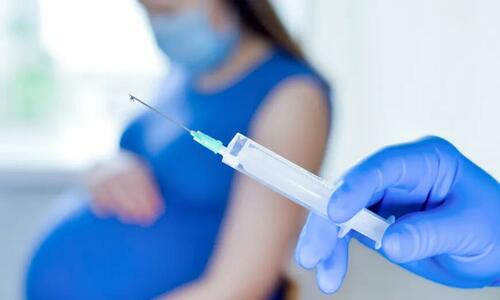
Authored by Megan Redshaw, J.D. via The Epoch Times (emphasis ours),
The premier professional membership organization for obstetricians and gynecologists accepted $11.8 million from the Department of Health and Human Services (HHS) to promote COVID-19 vaccines to pregnant women, despite the exclusion of pregnant women from clinical trials and regulatory data showing the vaccine had not been tested for safety during pregnancy.

To learn more about COVID-19 funding received by the American College of Obstetricians and Gynecologists (ACOG) during the pandemic and what prompted the organization’s guidance on COVID-19 vaccines for pregnant women, Dr. James Thorp, a board-certified obstetrician-gynecologist and maternal-fetal medicine physician made a Freedom of Information Act (FOIA) request in 2022 to HHS.
“My request was simple: It sought only to obtain documents involving the three ‘Cooperative Agreement’ grants HHS/CDC made to ACOG during the pandemic, one of which was for $11.8 million, listed on a publicly accessible open data source for federal spending, USASPENDING.gov,” Thorp told The Epoch Times.
Documents obtained by Dr. Thorp show ACOG, on Feb. 1, 2021, was awarded the first of three cooperative agreement grants by HHS and the CDC. The receipt of COVID-19 grant money was contingent upon ACOG yielding substantial control over projects funded by the CDC to the agency and ACOG’s full compliance with CDC guidance on COVID-19 infection and control.
“This is a cooperative agreement, and CDC will have substantial programmatic involvement after the award is made. Substantial involvement is in addition to all post-award monitoring, technical assistance, and performance reviews undertaken in the normal course of stewardship of federal funds,” the documents state.
ACOG also agreed to allow the CDC program staff to “assist, coordinate, or participate in carrying out effort under the award.”
The contracts further provided for the return of funding to the HHS if ACOG did not adhere to the federal government’s messaging that COVID-19 vaccines were safe and effective for pregnant women and new mothers.
HHS Funds ‘Trusted Messengers’ to Increase Vaccine Confidence
HHS, on April 1, 2021, launched the “COVID-19 Community Corps,” a “nationwide, grassroots network of local voices and trusted community leaders to encourage vaccinations,” with more than 275 founding member organizations, including ACOG, that had the “ability to reach millions of Americans.” An archived HHS webpage states the program provides resources and fact-based public health information through HHS in partnership with the CDC.
As part of the multibillion-dollar program, Vice President Kamala Harris and Surgeon General Vivek Murthy met with founding members to discuss the next phase of the “public education campaign from the White House” to encourage vaccinations and increase vaccine confidence.
Members received weekly updates on the “latest scientific and medical updates, talking points about the vaccine, social media suggestions, infographics, factsheets with timely, accurate information, and tools to help people get registered for an appointment and vaccinated.”
“As part of the COVID-19 Community Corps, HHS awarded billions of federal dollars to recruit what HHS referred to as ‘trusted community leaders’ who could push vaccines within our most private relationships,” Thorp said. “Much like modern-day trojan horses, these ‘trusted messengers’ would be unique in their ability to permeate all facets of private life.”
ACOG Encourages Members to ‘Enthusiastically Recommend Vaccination’
Former CDC Director Dr. Rochelle Walensky, on April 23, 2021, announced for the first time during a White House COVID-19 briefing the agency was recommending all pregnant women get vaccinated despite limited data on the safety of the shot, as pregnant women were not included in COVID-19 vaccine clinical trials.
Dr. Walensky said her decision was based on preliminary findings published in The New England Journal of Medicine on the use of COVID-19 vaccines during the first 11 weeks of the vaccine rollout.
“We know that this is a deeply personal decision, and I encourage people to talk to their doctors and their primary care providers to determine what is best for them and for their baby,” Dr. Walensky said.
ACOG, on July 30, 2021, along with the Society of Maternal Fetal Medicine (SMFM), began recommending COVID-19 vaccination in pregnancy.
ACOG, founded in 1951, is the leading organization representing physicians and specialists in obstetrical care, with over 60,000 members. ACOG sets the standard of care for pregnant women and obstetrician–gynecologists generally follow the recommendations made by ACOG, just as pediatricians follow the recommendations of the American Academy of Pediatrics.
The SMFM represents more than 5,500 individuals with additional years of formal training in maternal-fetal medicine, making them “highly qualified experts and leaders in the care of complicated pregnancies.”
ACOG’s former president, Dr. J. Martin Tucker, in a statement on the organization’s website, encouraged members to “enthusiastically recommend vaccination” to their pregnant patients and to emphasize the “known safety of the vaccines and the increased risks of severe complications associated with COVID-19 infection, including death, during pregnancy.”
“It is clear that pregnant people need to feel confident in the decision to choose vaccination, and a strong recommendation from their obstetrician–gynecologist could make a meaningful difference for many pregnant people,” Tucker added. “Pregnant individuals should feel confident that choosing COVID-19 vaccination not only protects them but also protects their families and communities,” he added.
Dr. William Grobman, president of SMFM, said experts in high-risk pregnancy should “strongly recommend” pregnant women get vaccinated and that vaccination is “safe before, during, or after pregnancy,” despite the absence of clinical trial data.
Read more here...
Authored by Megan Redshaw, J.D. via The Epoch Times (emphasis ours),
The premier professional membership organization for obstetricians and gynecologists accepted $11.8 million from the Department of Health and Human Services (HHS) to promote COVID-19 vaccines to pregnant women, despite the exclusion of pregnant women from clinical trials and regulatory data showing the vaccine had not been tested for safety during pregnancy.

To learn more about COVID-19 funding received by the American College of Obstetricians and Gynecologists (ACOG) during the pandemic and what prompted the organization’s guidance on COVID-19 vaccines for pregnant women, Dr. James Thorp, a board-certified obstetrician-gynecologist and maternal-fetal medicine physician made a Freedom of Information Act (FOIA) request in 2022 to HHS.
“My request was simple: It sought only to obtain documents involving the three ‘Cooperative Agreement’ grants HHS/CDC made to ACOG during the pandemic, one of which was for $11.8 million, listed on a publicly accessible open data source for federal spending, USASPENDING.gov,” Thorp told The Epoch Times.
Documents obtained by Dr. Thorp show ACOG, on Feb. 1, 2021, was awarded the first of three cooperative agreement grants by HHS and the CDC. The receipt of COVID-19 grant money was contingent upon ACOG yielding substantial control over projects funded by the CDC to the agency and ACOG’s full compliance with CDC guidance on COVID-19 infection and control.
“This is a cooperative agreement, and CDC will have substantial programmatic involvement after the award is made. Substantial involvement is in addition to all post-award monitoring, technical assistance, and performance reviews undertaken in the normal course of stewardship of federal funds,” the documents state.
ACOG also agreed to allow the CDC program staff to “assist, coordinate, or participate in carrying out effort under the award.”
The contracts further provided for the return of funding to the HHS if ACOG did not adhere to the federal government’s messaging that COVID-19 vaccines were safe and effective for pregnant women and new mothers.
HHS Funds ‘Trusted Messengers’ to Increase Vaccine Confidence
HHS, on April 1, 2021, launched the “COVID-19 Community Corps,” a “nationwide, grassroots network of local voices and trusted community leaders to encourage vaccinations,” with more than 275 founding member organizations, including ACOG, that had the “ability to reach millions of Americans.” An archived HHS webpage states the program provides resources and fact-based public health information through HHS in partnership with the CDC.
As part of the multibillion-dollar program, Vice President Kamala Harris and Surgeon General Vivek Murthy met with founding members to discuss the next phase of the “public education campaign from the White House” to encourage vaccinations and increase vaccine confidence.
Members received weekly updates on the “latest scientific and medical updates, talking points about the vaccine, social media suggestions, infographics, factsheets with timely, accurate information, and tools to help people get registered for an appointment and vaccinated.”
“As part of the COVID-19 Community Corps, HHS awarded billions of federal dollars to recruit what HHS referred to as ‘trusted community leaders’ who could push vaccines within our most private relationships,” Thorp said. “Much like modern-day trojan horses, these ‘trusted messengers’ would be unique in their ability to permeate all facets of private life.”
ACOG Encourages Members to ‘Enthusiastically Recommend Vaccination’
Former CDC Director Dr. Rochelle Walensky, on April 23, 2021, announced for the first time during a White House COVID-19 briefing the agency was recommending all pregnant women get vaccinated despite limited data on the safety of the shot, as pregnant women were not included in COVID-19 vaccine clinical trials.
Dr. Walensky said her decision was based on preliminary findings published in The New England Journal of Medicine on the use of COVID-19 vaccines during the first 11 weeks of the vaccine rollout.
“We know that this is a deeply personal decision, and I encourage people to talk to their doctors and their primary care providers to determine what is best for them and for their baby,” Dr. Walensky said.
ACOG, on July 30, 2021, along with the Society of Maternal Fetal Medicine (SMFM), began recommending COVID-19 vaccination in pregnancy.
ACOG, founded in 1951, is the leading organization representing physicians and specialists in obstetrical care, with over 60,000 members. ACOG sets the standard of care for pregnant women and obstetrician–gynecologists generally follow the recommendations made by ACOG, just as pediatricians follow the recommendations of the American Academy of Pediatrics.
The SMFM represents more than 5,500 individuals with additional years of formal training in maternal-fetal medicine, making them “highly qualified experts and leaders in the care of complicated pregnancies.”
ACOG’s former president, Dr. J. Martin Tucker, in a statement on the organization’s website, encouraged members to “enthusiastically recommend vaccination” to their pregnant patients and to emphasize the “known safety of the vaccines and the increased risks of severe complications associated with COVID-19 infection, including death, during pregnancy.”
“It is clear that pregnant people need to feel confident in the decision to choose vaccination, and a strong recommendation from their obstetrician–gynecologist could make a meaningful difference for many pregnant people,” Tucker added. “Pregnant individuals should feel confident that choosing COVID-19 vaccination not only protects them but also protects their families and communities,” he added.
Dr. William Grobman, president of SMFM, said experts in high-risk pregnancy should “strongly recommend” pregnant women get vaccinated and that vaccination is “safe before, during, or after pregnancy,” despite the absence of clinical trial data.
Read more here…
Loading…





